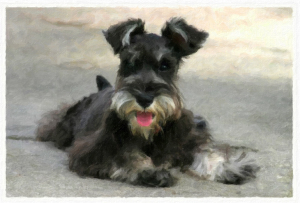The Miniature Schnauzer has found its way into the hearts and lives of thousands of admirers who love her engaging personality. The most popular Terrir breed, the Miniature Schnauzer is of German descent and was developed in the 1890s to cross with the Miniature Pinscher or the Affenpinscher by small variations of the standard Schnauzer. They are intelligent and easily trained, do well in obedience, and on the home front is a super watchdog dedicated to his family. The Miniature Schnauzer size: up to 14 inches at the shoulder for both sexes, they are suitable for a house in the city or in the countryside. His fur makes this the perfect choice for people suffering from allergies. The coat can be solid black, or black and gray with silvery-white stripes. The breed should be combed about three times a week to keep the beard and legs tangle-free. The miniature schnauzer is a great companion for children who can meet its high energy, they can quickly learn fun tricks if they get the attention it needed.
History
The Miniature Schnauzer, or Mini Schnauzer, originated in Germany, where it is known as the Zwergschnauzer (“Zwerg” means “dwarf” or “midget”). The breed is thought to be a cross between the Standard Schnauzer, the Affenpinscher, and, some say, the Poodle. They were bred to maintain the same look and features of the Standard Schnauzer with a more manageable size. They were mainly used on farms for hunting vermin, pulling carts, guarding flocks and children, and serving as watchdogs. Mini Schnauzers were exhibited as a separate breed in 1899 and were introduced to the North American continent in 1925.
Breed Group
Breed Group
The Mini Schnauzer is classified in the Terrier group.
Height
Mini Schnauzers usually range from 12 to 14 inches high at the withers.
Weight
Mini Schnauzers usually weigh between 11 and 18 pounds. They like to eat and often extra pounds easily, so they should not be allowed to eat and should be given plenty of opportunity for exercise.
Color
There are three common colors relative to the “standard” for a Mini Schnauzer: salt and pepper, black and silver or black. Although there seem to be lots of white Mini Schnauzers, this color is not recognized in terms of meeting the standard for the breed.
Appearance
The Mini Schnauzer has a square-shaped body, a wiry coat, bushy eyebrows, a prominent beard and a big black nose. The ears of the Mini Schnauzer In recent decades, trimmed to a point and its tail is docked. Although this is still common for show dogs, it is not uncommon to see family Minis with “natural” floppy ears and longer tails.
Grooming
The Mini Schnauzer sheds very little, but it should be two or three times a week and cut to four to six weeks stay looking its best. Brushed Will coat If not brushed regularly, tangled and matted. Must be cut. In this case, nodes The Mini Schnauzer coat is usually clipped short on the body the hair is longer on the left chest, abdomen and legs. The face is cut to emphasize distinctive beard and eyebrows Minis. Mustache and beard must be cleaned after meals.
Temperament
Mini Schnauzers are friendly, affectionate, curious and intelligent. They are loyal and eager to please, and they make a good family pet. They are generally good with children but should be supervised with young children who may tease or play too rough. If they are not properly trained and socialized, Mini Schnauzers can cause problems with other dogs, but usually get along well with their peers. Minis can be stubborn and sometimes bossy, but they are sweet, smart and easy to train. Obedience training should be started at a young age.
Special Abilities
The Mini Schnauzer is superior sniffer and has an excellent nose for tracking pests. Some airports Mini Schnauzers as drug sniffing dogs. The Mini Schnauzer also has superior hearing and makes a great watchdog. He will generally notice the approach of a visitor takes a long time for his human. Excessive barking at visitors can be a problem, but one that can be corrected with consistent discipline. Can the Mini Schnauzer With proper training do very well in obedience and agility competition. The Mini is also eligible for Earthdog competitions and excel in them.
Health Problems
Mini Schnauzers have a life expectancy of between 12 and 15 years. Minis can while generally healthy development. Diabetes, pancreatitis, liver disease or bladder stones They are also prone to allergies, skin diseases and cysts, and develop eye problems.




